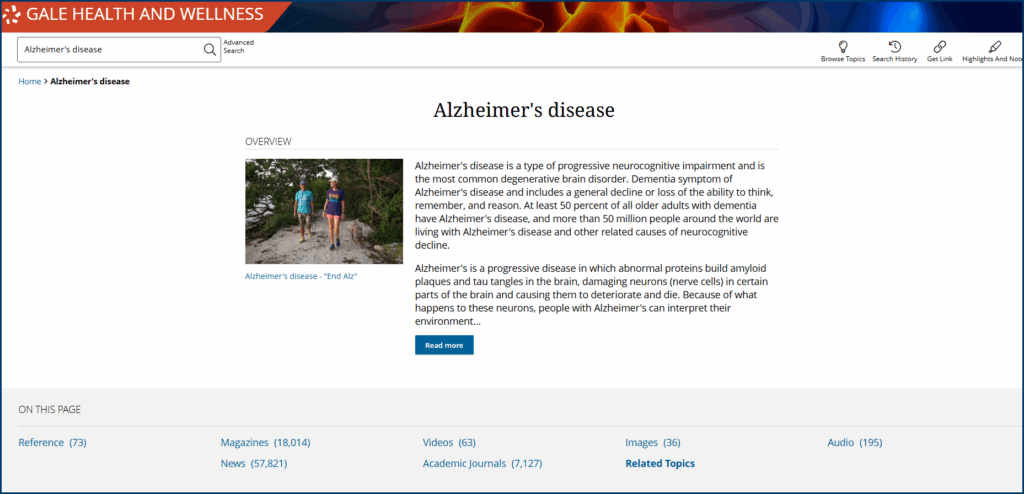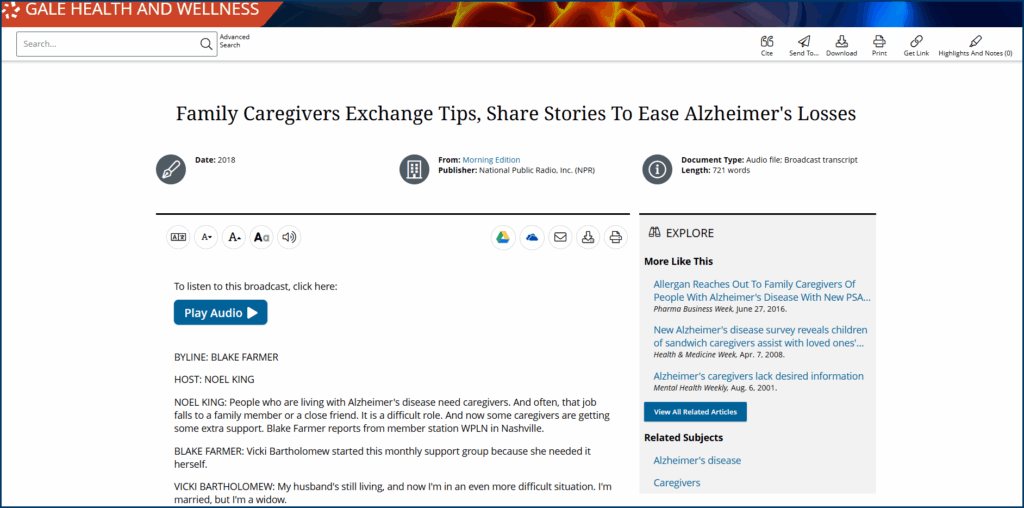| By Gale Staff |
The United States is older than ever before. According to the Population Reference Bureau (PRB), the median age of the United States increased by nearly a decade from 1980 to 2022—from 30.0 to 38.9 years. And with an aging population, the risks of Alzheimer’s disease and other forms of dementia become more prevalent. In keeping with population trends, the number of dementia cases is on course to triple by 2050.
But as millions of Americans act as caregivers for loved ones living with Alzheimer’s, the sharp increase in the number of patients is only half the story. For patients and caregivers alike, the best response is to equip ourselves with knowledge, including understanding potential strategies for prevention and symptom management.
As trusted community partners, libraries are uniquely positioned to step into this space. With Alzheimer’s and Brain Awareness Month in June, take advantage of your Gale Health and Wellness subscription to solidify your position as a hub for information, support, and understanding—start with the Alzheimer’s topic page.
Understanding Alzheimer’s
Alzheimer’s is a uniquely cruel disease that can gradually diminish a person’s cognitive abilities and take away a lifetime of memories. Alzheimer’s disease is the most prevalent form of dementia—an umbrella term for a group of diseases with similar symptoms affecting cognitive function.
This progressive neurodegenerative disorder affects memory, thinking, and behavior. As the disease progresses, individuals experience increasing difficulty with everyday tasks. While there is currently no cure, ongoing research and development of new therapies can help us better understand the disease and develop effective treatments to slow its progression and manage symptoms.
Although Alzheimer’s can affect individuals at various stages of life, the risk of developing the disease increases significantly with age, and people over 65 tend to be most vulnerable. Besides age, a family history of Alzheimer’s is another notable risk factor. Lifestyle factors and other health conditions—such as cardiovascular disease, high blood pressure, and diabetes—may also play a role in increasing the risk of developing Alzheimer’s.
Recognizing the warning signs of Alzheimer’s is crucial for early diagnosis and intervention. Common early indicators include memory loss that disrupts daily life, such as forgetting recently-learned information or repeatedly asking the same questions. Other warning signs include:
- Trouble understanding visual images and spatial relationships
- New problems with words in speaking or writing
- Challenges in planning or problem-solving
- Withdrawal from work or social activities
- Difficulty completing familiar tasks
- Losing the ability to retrace steps
- Changes in mood and personality
- Confusion with time or place
- Decreased or poor judgment
- Misplacing things
It’s important to note that experiencing some of these signs does not necessarily mean someone has Alzheimer’s. Persistent or concerning changes, however, should be evaluated by a healthcare professional.
Prioritizing Accessible, Relevant Information
There’s a lot we don’t know about Alzheimer’s, but we’re learning more every day.
The Alzheimer’s topic page on Gale Health and Wellness presents reliable information on a range of top-of-mind questions, including treatment and prognosis. Our robust suite of accessibility tools includes translation to more than 40 languages, text-to-speech, and the ability to modify the font for an easy reading experience—no pop-ups, ads, or sponsored content.
By sharing the latest information, from potential causes and risk factors to news stories on upcoming treatment options, Gale Health and Wellness positions your library as a place where patients and their loved ones can find the information they need.
Multimedia Tools to Support Patrons
Gale Health and Wellness has a library of more than 60 videos and nearly 200 audio files on the topic of Alzheimer’s disease—plus, thousands more for other conditions. Having access to this library of vetted and engaging content allows your patrons to interact with material in their preferred format.
One video from HealthDay showcases how aerobic exercise can make a positive impact on the health of people living with Alzheimer’s. A study highlighted in the video found that patients who participated in a 16-week exercise program displayed far fewer neuropsychiatric symptoms, including anxiety, irritability, and depression.
To help your patrons know that they aren’t alone, Gale Health and Wellness includes videos from the perspective of caregivers. In one, a son reflects on caring for his mother long distance, including weekly trips from Connecticut to northern Vermont. Another video captures a performance by Leslie Rodriguez Kritzer from The Memory Show, a musical on a mother and daughter learning to cope with the impact of Alzheimer’s on their lives and relationship.
Head Healthy Prevention Strategies
When it comes to Alzheimer’s disease and dementia, knowledge is power. In addition to supporting patients and their loved ones who are coping with a diagnosis, consider using Alzheimer’s and Brain Awareness Month as an opportunity to highlight head healthy prevention strategies.
Turn to Gale Health and Wellness for key clinical recommendations to support cognitive health. Here are some quick tips that can benefit all of us:
- Exercise daily.
- Avoid smoking.
- Eat high-quality foods, such as green leafy vegetables, whole grains, and seafood.
- Participate in engaging activities that require cognition, such as reading and writing letters.
- Refrain from excessive alcohol consumption; women should limit themselves to one drink a day, and men to two.
Community Engagement Opportunities
Alzheimer’s and Brain Awareness Month is an important opportunity to not only broaden awareness and boost knowledge, but to build community. Consider taking to social media or hosting in-person activities to foster a sense of connection for your patrons whose lives have been touched by Alzheimer’s.
Connect on Social Media
For people living with Alzheimer’s as well as loved ones and caregivers, link to resources such as the Alzheimer’s Association’s 24/7 helpline. By dialing 800-272-3900, callers can reach specialists and master’s-level clinicians ready to offer confidential support and information. The Alzheimer’s Foundation of America also hosts a helpline operated by licensed social workers, available via phone (866-232-8484) and text (646-586-5283).
You might also spotlight material found within Gale Health and Wellness to help your patrons better understand ways to support and care for friends and loved ones. Articles include advice on how to talk with friends living with Alzheimer’s, and stories from caregivers dealing with a loved one’s diagnosis.
By highlighting the wealth of digital resources available through your Gale Health and Wellness subscription, you are positioning your library as a trusted partner ready to support your community, even on the most difficult journeys.
Bring the Community Together with In-Person Gatherings
Support groups cultivate a sense of togetherness among like-minded people, addressing patients and families’ need not only for medical support, but emotional support.
Some research has shown that engaging in creative activities may help to prevent or alleviate Alzheimer’s symptoms. You might lend space in your library to connect Alzheimer’s patients with an outlet for their creativity. An artist-led group in San Rafael, California, engages in expressive artwork that unites painting with narrative. The workshops, open to participants across different stages of dementia, help reduce anxiety and improve communication.
Memory Cafes are a unique forum for people living with Alzheimer’s (or other forms of dementia) and their loved ones. Events typically last 1–2 hours, and offer an ideal space for people to socialize and share in an environment where their feelings and experiences are readily understood. Check here to see if there are any in your area. If not, consider hosting one in your library!
Whatever sort of activities you decide to host, your patrons are bound to appreciate it as one of many ways you consistently show support for the community.
Rely on Gale Health and Wellness
As a respected community pillar and a place that people turn to for reliable information, your library is ideally situated to connect patients with resources that answer their most pressing questions while also addressing their emotional needs. With a subscription to Gale Health and Wellness, you can trust that the information you’re providing is up-to-date, reliable, and suitable for the needs of your patrons.
Together, we can provide patients, caregivers, and family members a helping hand as they navigate an uncertain path. Your leadership and support remind your patrons that they are never walking alone.
If your library isn’t already a Gale Health and Wellness subscriber, reach out to your sales representative for more information on how Gale’s suite of databases can support your community’s needs.



